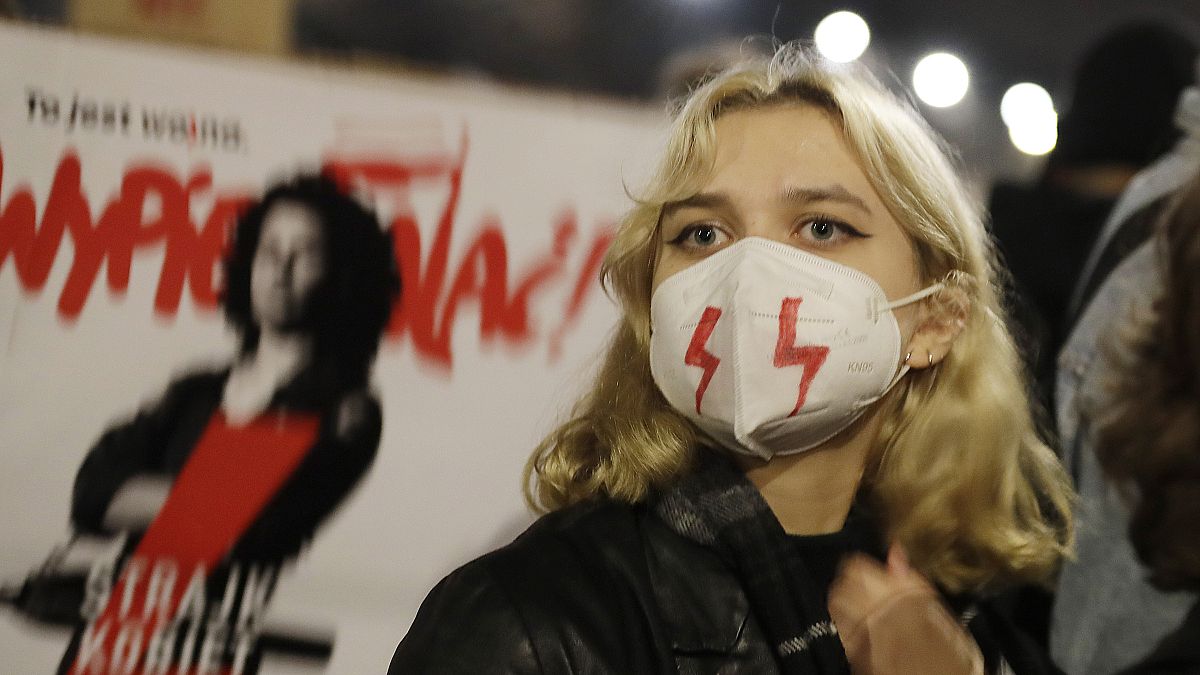Whatever your view is on the abortion issue itself, the way the recent ruling in Poland came about should worry everyone in the EU, especially those sitting in the European Quarter in Brussels, says Euronews' Political Editor Darren McCaffrey.
This week, while most of us were understandably focused on events on the other side of the Atlantic, maybe we should have been paying a bit more attention to Poland.
The government, under enormous pressure, has delayed implementation of a controversial court ruling, which would see almost all abortions made illegal. “There is a discussion going on, and it would be good to take some time for dialogue and for finding a new position in this situation, which is difficult and stirs high emotions,” Michał Dworczyk, the head of the prime minister’s office, said on Tuesday.
The decision to delay follows two weeks of large-scale protests including one last Friday in Warsaw when hundreds of thousands took to the streets holding placards proclaiming: “I wish I could abort my government.” Poland hasn’t seen anything like this since the collapse of communism 1989.
Under the current law, terminations of pregnancies can only happen in three circumstances: when there is a fetal abnormality, a threat to a woman’s health, and in cases of incest or rape. The country’s Constitutional Tribunal has ruled, however, that cases involving fetal abnormalities should be made illegal. In Poland that is pretty much all legal abortions — 1,074 of 1,100 were carried out for this reason last year. Tens of thousands also travel outside the country every year to places like Germany to get abortions.
Given the level of dissent, has the conservative ruling party, PiS, completely misjudged public opinion? Well, it seems that way. Part of their success (they have won the last four national elections) is their endorsement of the so-called traditional Polish family. Their strong line on abortion and anti-LGBT rhetoric have also played well with their most adherent supporters and the Catholic Church, which is powerful in the county. Poland is still largely a socially conservative country. Remember, even without these changes, the country still has one of the strictest abortion laws in Europe.
A poll from 2018 showed 70 per cent of Poles were against banning abortions in cases of fetal defects and, among government supporters, this figure stood at it 40 per cent. There is little to suggest this has changed much. Some within the government have even questioned whether the new legislation is the right move. One of Poland's deputy prime ministers, Jarosław Gowin, said: “The law must uphold values but the law cannot force women to be heroic.”
A reminder that we must never fall into the trap of assuming that governing parties are wholly reflective of populations. It is all too easy to talk in collective terms about countries like Poland and Hungary without understanding the level of opposition to the ruling party. Yes, the Law and Justice party have been in power for five years but in July they held onto the Presidency with just the narrowest of margins. Poland is a divided country.
Abortion laws are domestic laws determined by governments and in some cases courts. But in this instance, does the EU have a role to play? Ultimately, the courts passed this judgement because repeated attempts to legislate had failed — there is simply too much opposition to the law. The courts have been systematically packed with PiS supporters in recent years as a clever means to change laws.
Brussels and the European Court of Justice have time and again bemoaned and condemned the lack of judicial independence in Poland. This ruling appears to be a fairly concrete example of the absence of this safeguard in action. So why have we heard little from the Commission or indeed the German Presidency on this? Ursula Von Der Leyen and Charles Michel talk a good game about the rule of law and European values but when faced with reality, the silence from the Berlaymont is almost deafening. Today’s announcement on linking EU funding to respect for the rule of law will have to be judged on how effective it is in practice.
The European Union is, in part, there to carry out checks and balances on national governments. It should support countries when they need help but take action whenever they veer off course. But, as I said before, that wasn't the case this time. Whatever your view is on the abortion issue itself, the way this ruling came about should worry everyone in the EU, especially those sitting in the European Quarter here in Brussels.
